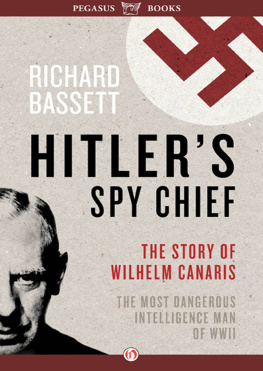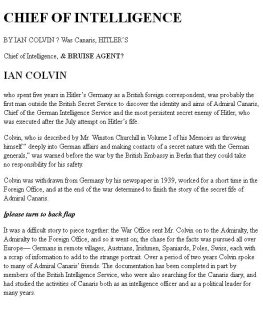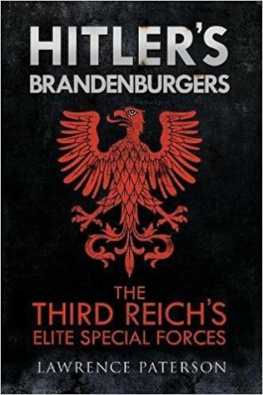HITLERS SPY CHIEF
Richard Bassett

PEGASUS BOOKS
NEW YORK
IN MEMORY OF
Julian, Alan and Nicholas whose world this was.
AND FOR
Beatrice and Edmund whose world this may, with luck, never be.
Contents
Preface
The would-be biographer of Canaris could hardly choose a more difficult subject. Notwithstanding several excellent biographies on him, notably by Andr Brissaud and Heinz Hoehne, the mystery of the German admiral who somehow helped Britain win the war remains, even more than fifty years after his death. Despite the thousands of words devoted to the admiral after the war, the riddle of his links with Britain continue to cast shadows over almost every chapter of the wars history. It is therefore with some trepidation that I have attempted to shine my torch into the already much visited and, by now, quite Stygian cellars of the Abwehr.
The hazards of working with material related to secret operations are immense. Long-standing friendships with this or that member of a particular service are only a disadvantage, as events still covered by the Official Secrets Act and therefore subject to archival embargo obviously cannot be discussed. The consistency with which the most modest and oblique of enquiries have been met with a wall of dignified and amicable silence in certain quarters, usually quite voluble on other topics, is an impressive testament to the oaths of loyalty that servants of the Crown, distinguished and undistinguished, embrace. If there is one great lesson to be learnt by those who research the more obscure dealings of the British secret services during the war, it is that the officers of those services cannot, on the whole, be persuaded to break their vows. For those who believe that a country without an efficient and loyal intelligence force is automatically doomed, this is reassuring.
It is, however, always a pleasure to be able to talk to men who took part in what Lewis Namier called, albeit in a less capitalist age, the transactions of contemporary history. Moreover, as he pointed out, a great many profound secrets are always somewhere in print and easily detected when one knows what to seek. Previous knowledge is a marvellous stimulant to cogent reasoning and astute deductions. However, the published literature is pitted with inaccuracies and false trails, and the unpublished archives are occasionally contradictory.
To illustrate this point, Namier recalled a story related by Sir Arthur Conan Doyle on how, when crossing Paris from the Gare de Lyon to the Gare du Nord on his way back from the Riviera, the taxi-driver acknowledged his generous tip with the words, Thank you, Sir Conan Doyle. The author of the greatest detective stories of his time was astounded. How do you know who I am?, he asked, to which the driver replied, I saw in the papers that you were coming from Cannes by way of Marseilles and I see that your hair is cut in the Cannes style and that on your boots is the mud of Marseilles.
Is this all you recognise me by?, the bewildered writer asked.
No, came the reply, on your luggage is your name, printed in very large letters.
There is much in print to help those wishing to focus on links between Canaris and his opposite number in the British secret service, Sir Stewart Menzies, and there can be no doubt that both men worked together for an understanding between Britain and Germany, with Churchills tacit encouragement, which could, by 1943, have led to the war ending far sooner than it did.
As to whether Menzies and Canaris ever met, the reader must draw his own conclusions. The circumstantial evidence appears to be against Menzies post-war and oft repeated mantra to journalists that the meeting never took place, though unsurprisingly, no documentation for such an encounter exists in the public domain.
The criteria for decisions taken by those in power are rarely easily understood, even when those decisions are taken in the full glare of modern democratic transparency. This is especially the case in time of war. However, it is not the purpose of this book nor would it, in my view, be appropriate for those of my generation, however well informed to pass judgement on those statesmen and servants of the Crown whose decisions vitally affected the duration of the Second World War. As Leo Amery once noted, it requires practical experience of great affairs to judge the conduct of public men fairly. In the intelligence world there is the added problem of facing confusing and different sets of choices, a situation which most people not in that world would have difficulty in understanding.
The story of Canaris illuminates in sharp relief the alternatives which faced those in power at the twentieth centurys moment of supreme crisis. The reader must decide for himself whether the very tangible chances of ending the conflict two years earlier with the consequent saving of life, certainly many millions, can be weighed successfully against the durable balance of power hammered out by the victors in 1945, which kept the peace of the world for half a century more or less though at a high price for the countries of central and eastern Europe.
One of the consequences of Canaris failure to achieve an understanding in 1943 is that the Germany that has emerged to take its place in the twenty-first century, after the total destruction of the twentieth, is without any shadow of a doubt a democratic, largely Christian country, committed to cooperation, consensus and values that are the exact opposite of those espoused by the Nazi regime. The Federal Republic, whatever its faults, has proved a stable and moderate cornerstone of peace in Europe for two generations.
Such a conversion may well have been possible without the nearannihilation of Germany that took place between 1943 and 1945. The desperate and often painful experiences of those families in post-war Germany who had been actively against the regime, and their often very difficult attempts at reintegration into post-war German society in the 1950s, suggest on the other hand that the virus of Nazism, with its powerful pagan hatreds, might have survived all but the most comprehensive of inoculation programmes.
The Germany that has entered the twenty-first century would have been recognisable to Canaris as a country more or less conforming to the Germany within the fold of Western civilisation, to quote Keynes, which he and his fellow conspirators strove for and which ultimately they and the little admiral died for.
Authors Note
This biography of Admiral Canaris, the first to appear in English for nearly thirty years, caused some controversy among those historians who reviewed it in England on its arrival early in 2005. I am grateful to them for focusing, mostly to the exclusion of anything else, on points which bore often little relation or relevance to the basic narrative.
Certainly, with only limited knowledge of German, it is difficult for those historians and critics to grasp perhaps the main themes of the German spy chiefs career. I have found German sources often as enlightening as British ones which on the whole are rather dismissive of the German resistance and Canaris. Such are human affairs that even when they are most deserving of praise, they are often the subject of sinister interpretation by those who sit in judgement on the interior state of others.
More than fifty years after the end of the war, the enigma of Admiral Canaris, like that of the man with the dark lantern of the Powder Treason or that other man of mystery in the iron mask, continues to baffle and perplex. The false but oft-repeated mantra that the German opposition could have removed Hitler whenever they wanted continues to cast a shadow over Canaris integrity. One great advantage of generally accepted theory is that it is generally accepted. But repetition, however endless, does not make truth and, as has been pointed out in another context, where truth rests on evidence













